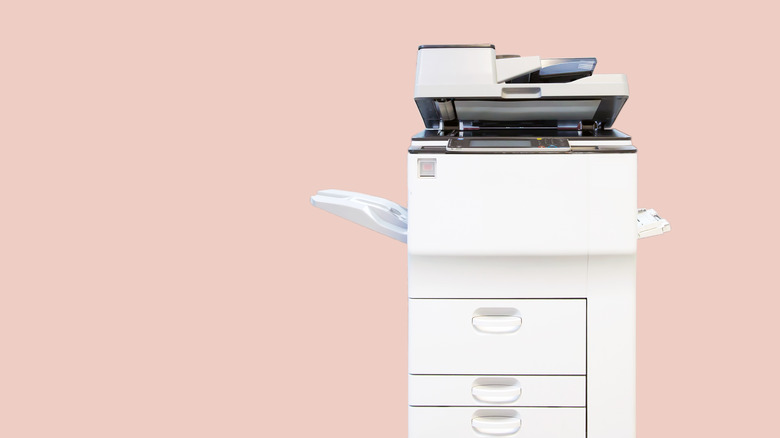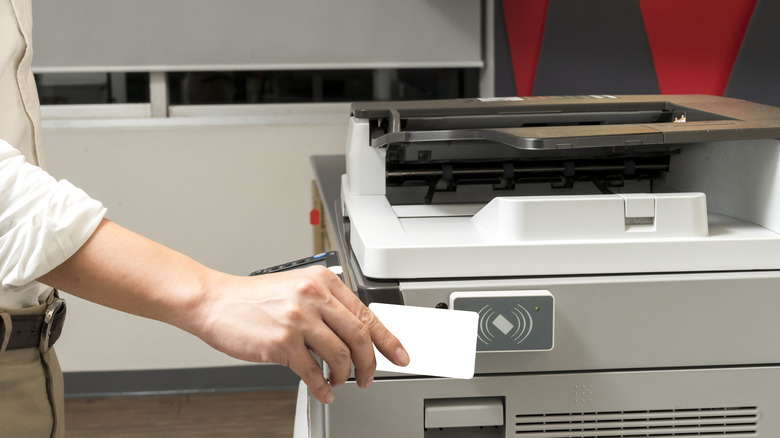Why You Should Stop Using Printers Immediately
If you work in an office, own your own business, or have an elaborate home office setup, chances are that you own or interact with a printer pretty frequently. Even if you don't personally print out documents, it's all but impossible to avoid the printed page. In fact, according to Waste Free Mail, the average American uses 700 pounds of paper products (for example, printed documents, books, paper towel, stationary, and so on) every single year! It's no surprise that printers have become an essential part of our day-to-day lives.
Since printers are so common, it's easy to take them for granted. After all, who thinks that they can be dangerous? Yet it's becoming increasingly apparent that printers can pose health and security risks (via CBC). Whether your office relies on its trusty heavy-duty printer or you have a small unit sitting next to your computer, it's important to understand the associated dangers so that you can minimize any risks.
Printers are a major security risk
Especially in a shared workspace, printers have major security weaknesses. If you print a document with sensitive information, there's a good chance that someone else who is waiting for a print job will see it. Since most shared printers allow you to print over WiFi or Bluetooth (as opposed to a wired connection), there is also a greater chance that a hacker — either someone who is in your building or operating remotely — can see the file. They may even be able to change some of your file's contents before it is printed. Certain changes may be hard to spot but can drastically change the meaning of documents (for example, changing the numbers in spreadsheets). Even though these types of attacks are more common via cloud printing, they can still happen if you use a wired connection.
As if that weren't enough, printer logs are also a major challenge to confidentiality. Though these logs might seem innocuous, they may contain information about your computer and print jobs that can be accessed even after the printer itself is no longer in use. Some printers might even log the full contents of each printed document, making them particularly risky when dealing with sensitive information, warns Security Today.
Printers are prime hacking targets
As cloud printing has become more popular, it's also become easier to find printers that can print remotely. It's hard to beat the convenience of sending an important document to a printer in your boss's office while you're lying in bed. However, remote connectivity capabilities come with the risk of being hacked. Even if printers advertise security features, no device is totally safe.
Over the years, there have been several major printer vulnerabilities that affect hundreds of models across different manufacturers. This includes a pair of white-hat hackers (hackers who look for vulnerabilities so that they can be fixed) found two major issues with HP printer models, as noted by Forbes. In theory, these vulnerabilities could allow criminals to enter a home or workplace's internet network and potentially spread viruses to any connected devices.
To their credit, some printer manufacturers do offer software updates for their printers that remove any known security issues. However, when you have an endless list of things to do, updating your printer software is probably at the bottom of your list. Although workplaces may have IT departments who will go out of their way to install any updates, printers in small companies and homes do not always receive the same attention.
Toner is linked to genetic changes
While you might be willing to write off security risks as a necessary evil, especially if your printer connection is wired-only and you aren't handling any confidential information, they are far less terrifying than the possible health risks associated with printer toner. A study conducted by Nancy Lan Guo, a researcher at West Virginia University, found that tiny toner particles that can blow off of laser printers have the potential to impact both our metabolism and our genes, per Science News. These extremely disturbing changes are linked to brain, metabolism, and heart problems and even occurred in rats when the animals were only exposed to toner nanoparticles for a single day.
Although Guo's initial study took place on rats, she was disturbed to find the same changes in young adults who worked at a Singaporean printing company. To minimize risk, Guo recommends installing proper ventilation in rooms with laser printers. She also put extra emphasis on pregnant women being careful since gene changes are passed along to future generations. Unfortunately, it isn't always practical for workplaces or home offices to be retrofitted with better ventilation. In those cases, if printing is essential, it might be best to open a window and leave the room for a while, though some risk still remains. At the end of the day, it's far healthier to avoid using a printer if you are able to do so.



